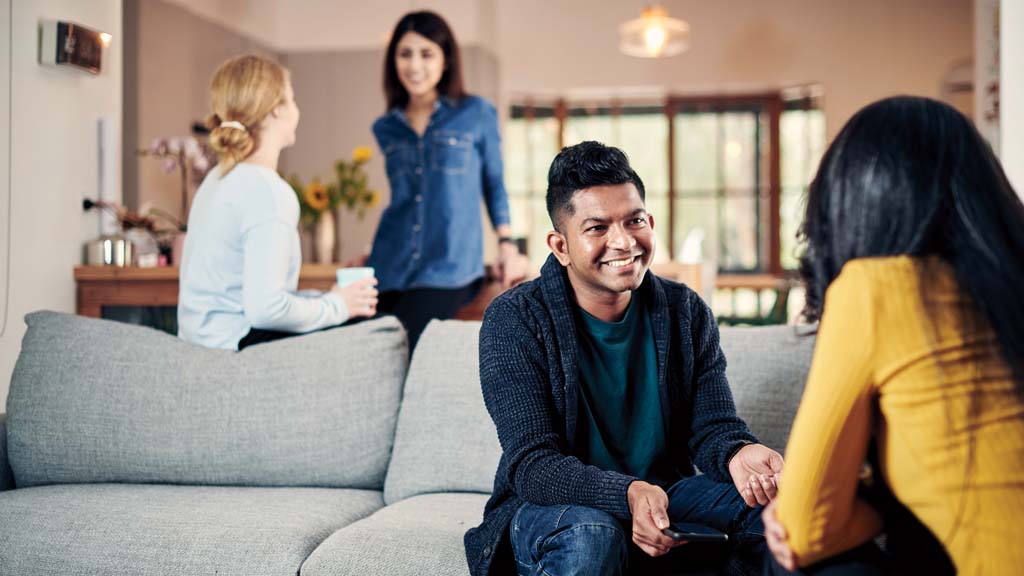Have you done a good deed today? Here’s why simple acts of kindness can boost your wellbeing
We’ve all experienced it before: that tingle of happiness that floods your mind when you give something to someone else. Indeed, research shows people who are keen to do good are more likely to rate themselves as happy. This is the power of generosity – it benefits giver and receiver. And the good news is you don’t have to do anything drastic. Simple actions like buying a friend coffee, baking biscuits for your colleagues or volunteering for a short period of time are enough to get those feel-good vibes flowing.
For ideas about how you can give more to increase your sense of connection to others, check out the DeakinWELLBEING app. It includes interactive tools, videos and podcasts that can enhance relaxation, focus, energy, mood and productivity in minutes. Challenge yourself to do three random acts of kindness over a week and note how they make you feel via your personalised app profile – you may be surprised at the positive effects these small actions can generate!
Why is giving so good for you?
It’s simple, really: even though we don’t benefit directly from our actions, being generous makes us feel warm and fuzzy. ‘By definition, you’re not trying to get a benefit out of being generous, but you can actually get some benefit from doing something for someone else – it gives you a sense of purpose and wellbeing,’ says Associate Professor Patrick Stokes from the Faculty of Arts and Education at Deakin University.
Being generous – everything from giving someone directions to helping a friend move house – activates the part of the brain that makes you feel pleasure. Plus, it releases a hormone called oxytocin that helps mediate social interactions and emotion – the higher your oxytocin levels, the more you’re likely to give.
The mechanism is so powerful than even thinking about being generous can boost your mood. A recent Swiss study found people who planned to spend money on other people reported higher levels of happiness than people who intended to keep the cash for themselves.
How long does it take to realise the power of generosity? Measuring happiness is big business, and research shows that committing an act of kindness once a week for six weeks is associated with an increase in wellbeing.
Just imagine the huge boost in wellbeing felt by people who give over a long period of time, like Fay Lawry, who has supported Deakin students for 30 years through the Roslyn Lawry Award, established in memory of her daughter.
‘You can actually get some benefit from doing something for someone else – it gives you a sense of purpose and wellbeing.’ Associate Professor Patrick Stokes,
Faculty of Arts and Education, Deakin University
So, why do some people give and others don’t?
We all have friends willing to pitch in at the community garden or give us a lift home even though it’s out of their way. Likewise, we all know people who keep their windows wound up at the traffic lights when the collection tins are doing the rounds. So what determines our giving behaviour?
It depends how we perceive what we have to give, explains Assoc. Prof. Stokes. ‘If you understand what you have is a product of good fortune, then you should be likely to be generous because you understand that what you have is something you have almost gratuitously yourself, so giving it to other people makes a certain kind of sense.’
This was true for Deakin arts/commerce graduate Brad Underhill, who received the Bowater Trust Medal in 2017. Brad believed he was in a more fortunate position than others and felt uncomfortable taking the $5000 prize away from someone else. He decided to put the money back in and, together with the Bowater Trust and Deakin Business School, started a brand new program called the Underhill Bowater Paying it Forward scholarship. Today, that scholarship is helping one student, Carina Mammone, get through her double degree in public health and commerce.
On the flip side, Assoc. Prof. Stokes says, ‘if you think that what you have is your right or entitlement, then you can rationally justify to yourself giving less of it away.
‘Once we see how much of our lives are based on pure good luck, that should make us more generous people.’
Keen to give back to others?
Whether you have a history of generosity or not, it’s never too late to start giving to others. Indeed, Assoc. Prof. Stokes says we depend on it for a prosperous society.
‘Humans are very fragile creatures,’ he says. ‘We can only really survive because of our generosity and mercy towards other people. Ask yourself what you’d lose by being generous. Are you going to give up something that you need desperately?’
Unsure where to start? Keep some loose change in your car for collection tins or a spare mask for someone who may have forgotten theirs. Visit a friend who’s having a hard time and do the dishes or pop on a load of washing. Just because.
Pushed for time? When it comes to giving back to the community, donating blood, mentoring a younger person and micro-volunteering – low-commitment, short-duration volunteer work that’s usually done online – are great options for time-poor folks.
